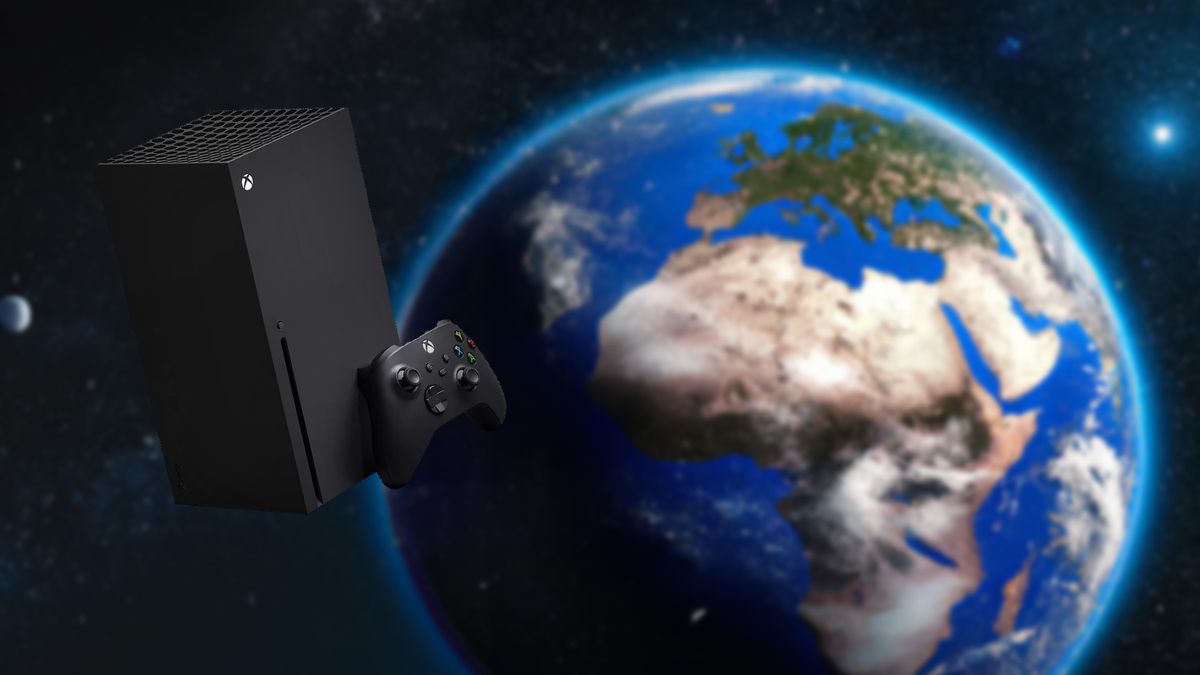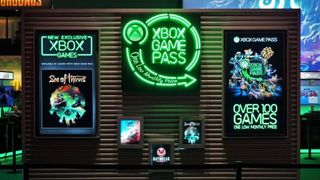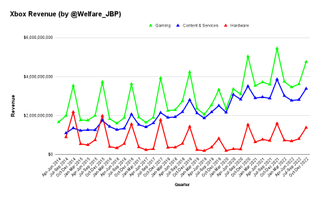Xbox's quarterly results prove that pure on-paper value isn't enough
The entire platform cannot be Xbox Game Pass.

Microsoft's quarterly financials made for some sober reading.
Preceded by layoffs to the tune of thousands of people, Microsoft yesterday revealed its Q4 2022 earnings to investors, largely matching its predictions and warnings from the previous quarters.
Owing to accurate predictions, Microsoft's share price rose by 5% in after hours trading on the results, as the firm outlined a tight 2023 with "modest" growth in the face of a turbulent global economic environment. Inflation is rampant, and Russia's war of aggression in Ukraine is disrupting energy markets and distribution. Changing business and consumer habits as the pandemic ends has led to a sharp drop in Windows and PC sales, since practically everybody who needs a laptop now has one as a result of the shift towards, and now away from work-from-home culture.
Microsoft saw growth with Office and Azure as expected, but one key area Microsoft saw a contraction with is Xbox.
It wasn't all bad news for Xbox, though. CVP of comms Frank Shaw revealed that Xbox's monthly active users hit a record 120 million, with Xbox Game Pass subscribers hitting new milestones. However, the particularities over the YoY decrease reveal just how crucial it is for Microsoft to fix one of Xbox's biggest weaknesses.
Value is the best Xbox exclusive right now ...

In this generation, Microsoft has found a lot of success prioritizing "value" in its offering to consumers, and that was clearly and absolutely the right thing to do for a variety of reasons. The obvious one is that consumers love value, especially in our current economic climate. Additionally, they offered some hard differentiation against the PlayStation 5, in the form of the 1080p-oriented Xbox Series S. For those who don't have the means or desire to upgrade to a 4K TV, some of the value of the PS5 and Xbox Series X is arguably diminished. For youngsters, students, or even people who just want to save a bit of cash, the $300 Xbox Series S is arguably a better buy for a lot of people. The Xbox Series S is only one aspect, though.
Arguably, so far, the best Xbox exclusive is in fact Xbox Game Pass. Xbox Game Pass has made waves in the industry owing to the value it's offering users, but also developers. In exchange for a lump sum, developers joining Xbox Game Pass can effectively instantly acquire an audience, who will further market the game via word of mouth. Microsoft reportedly also offers bonuses for engagement milestones too, so popular games hitting Xbox Game Pass have seen heaps of profitability both from Microsoft, and also boosts in retail sales even on other platforms.
Get the Windows Central Newsletter
All the latest news, reviews, and guides for Windows and Xbox diehards.

As for consumers, the Xbox Game Pass list is absolutely crammed with AAA games, indie darlings, and other perks and bonuses. For $15 a month, you get what is essentially thousands of dollars of content, including games from EA, content from Riot titles like League of Legends, and of course, all of Xbox's key exclusive games. Microsoft has also expanded Xbox horizontally, adopting new platforms like TVs and smartphones with Xbox Cloud Gaming, a service that is gradually improving to the point of being a completely viable alternative to physical Xbox gaming. It's also part of the $15 package, offering you instant access to games like Fortnite, Elder Scrolls, Fallout, and many more, on practically any device with WiFi.
Microsoft's key competitors, namely Sony PlayStation and Nintendo, do not offer this kind of value. Both PlayStation and Nintendo have subscription services, but they do not offer the same glut of quality content, nor do they hold the promise of day-one platform exclusives. If you want to grab a God of War or a Super Mario, you have to grab it at full price at retail, regardless of what subscription tier you choose on Nintendo Switch or PlayStation 5.
Despite this generous offering and cheaper hardware, Microsoft has lagged behind Sony and Nintendo both in the ongoing console war. The reasons why are pretty obvious.
... But it's not enough.

Right now, I would posit that Xbox has a desire problem. Recently, there was a trend across social media that kind of accentuated this in a weird way, where influencers posted selfies and said "do you want me, or the PS5." There were few people saying "do you want me, or an Xbox," unless they were being ironic. The post that spawned the most recent incarnation of the trend has 8.4 million views on Twitter. And sure, it's not quantitative, but it's at least illustrative of how Xbox's brand power has waned with the mainstream in recent years.
Apple puts a large emphasis on the prestige factor of its devices, whether it's marketing, inflated price points, and so on. Slick marketing campaigns and clever product placements create FOMO around the iPhone and even MacBooks. On paper, both of which offer less value than competing Windows-based PCs, and Android or even Windows Phones back in the day. Many of these devices come with bigger batteries, better displays, and better cameras, while also costing less. And sure, iPhones have caught up on the hardware front now. However, I would argue that, for the longest time, iPhone's biggest selling point was prestige.
I picked on iPhone as an example, but really, all brands attempt to do this. FOMO (fear of missing out) is an increasingly powerful marketing device leveraged in gaming. The entire concept of a time-limited battle pass is designed to incentivize play, as players are liable to miss out on precious cosmetics forever in some cases if they don't log on to play. You can debate the morality of artificial scarcity in digital products 'til the mooshrooms come home, but one area where it's certainly less debatable is the power it can have selling console hardware.

Xbox has only trended up and up since its inception, as you can see from the above graph from @Welfare_JBP, using data Microsoft has shared itself combined with some estimates, since we don't get hardware sales data anymore. In any case, the trends here is what we're most interested in, which illustrates Microsoft's 12% YoY dip in the gaming department.
Markets reacted strongly to the news, given that Microsoft's reporting was largely in line with what they'd told investors to expect. The past two years were record-breaking for Xbox, and a correction was absolutely bound to happen — investors clearly expected an even deeper contraction.
There are of course multiple factors as to why Microsoft retracted a bit this year. School, work, and college lockdowns in Microsoft's key markets are essentially a thing of the past now, with fewer hours being poured into gaming as availability decreases. However, the most notable aspect is Microsoft's truly anemic 2022 with regard to exclusive content. In the previous year, Microsoft had Halo Infinite, Forza Horizon 5, and Age of Empires IV all launch within the same quarter — all to critical acclaim. It's clear to me that the big green spike you see in 2021 is a direct result of platform-exclusive "system-seller" games. Microsoft enjoys a high average score on Metacritic, but still lacks in consistency and cadency with regards to FOMO-inducing broadly-enticing action games, like the God of Wars and Spidermans of the world.
The good news is, Microsoft knows it, and has already set its pieces in place to plug the gap.
And Microsoft knows it.

On January 25, 2023, Microsoft will debut its new Developer_Direct showcase format, which will offer gamers a more intimate first look at various upcoming Xbox games. This includes action games with broad audience potential, such as the multiplayer vampire slay 'em up Redfall, coupled with an accessible but deep Minecraft spin-off, dubbed Minecraft Legends. We'll also get a huge update for the massively multiplayer Elder Scrolls Online, and doubtless, a graphical technical showcase for the next Forza Motorsport.
None of this even includes 2023's headline act, which is undoubtedly Starfield. Starfield is the next game from Todd Howard and the team behind Fallout 3, and The Elder Scrolls V: Skyrim, the latter of which is an institute unto itself. Despite being out for over a decade and single-player only, Skyrim still enjoys thousands of daily active players owing to the volume of content and modularity of Todd Howard Bethesda games. I thoroughly expect Starfield to be a similar "event" in gaming history, which sees millions of players enjoying the space opera for years, maybe even decades to come.
If Starfield, Redfall, and those other broad-appeal titles hit as hard as Microsoft is hoping they will, Xbox should finally be able to generate some FOMO of its own.
Qualitatively again, I already know Starfield is a "system seller." Friends and relatives who previously had no interest in Xbox, or even hostility towards Xbox, are faced with the reality that if they want to play Starfield, the Xbox Series S is the cheapest way to play it natively. This is before the marketing for Starfield has even really ramped up. This is the prestige factor that Todd Howard and Bethesda bring to Xbox that declining titles like Halo used to do, and now Xbox has further franchises like this in its back pocket following the acquisition of ZeniMax, including Wolfenstein, DOOM, Fallout, and The Elder Scrolls itself. Soon, it may even count Activision titles like Diablo, Starcraft, and Call of Duty among those unique value propositions — if it can get the deal to acquire them through the regulatory hell it's currently in.
Either way, Microsoft has a potent slate of games on the horizon ready to plug this gap Xbox fans are all too familiar with. If Starfield, Redfall, and those other broad-appeal titles hit as hard as Microsoft is hoping they will, Xbox should finally be able to generate some FOMO of its own.

Jez Corden is the Executive Editor at Windows Central, focusing primarily on all things Xbox and gaming. Jez is known for breaking exclusive news and analysis as relates to the Microsoft ecosystem while being powered by tea. Follow on Twitter (X) and Threads, and listen to his XB2 Podcast, all about, you guessed it, Xbox!